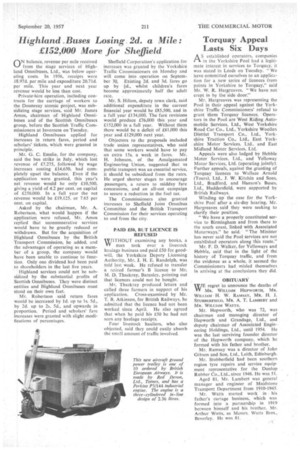Highland ,Buses Losing. 2d. a Mile : £152,000 More for Sheffield
Page 43

If you've noticed an error in this article please click here to report it so we can fix it.
ON balance, revenue per mile received from the stage services of Highland Omnibuses, Ltd., was below operating costs. In 1956, receipts were I8.97d. per mile and expenditure 20.71d. per mile. This year and next year revenue would be less than cost.
Private-hire operation, including contracts for the carriage of workers to the Dounreay atomic project, was subsidizing stage services, said Mr. James Amos, chairman of Highland Omnibuses and of the Scottish Omnibuses group, before the Scottish Traffic Commissioners at Inverness on Tuesday.
Highland Omnibuses applied for increases in return fares, period and scholars' tickets, which were granted in principle.
Mr. G. C. Emslie, for the company, said the bus strike in July, which lost revenue of £7,275, followed by wage increases costing £14,650, had completely upset the balance. Even if the application were granted, this year's net revenue would be only £10,500, giving a yield of 4.2 per cent. on capital of £250,000. In a full year the net revenue would be £19,125, or 7.65 per cent on capital.
• Asked by the chairman, Mr. A. Robertson, what would 'happen if the application. were refused, Mr. Amos replied that unremunerative services would have to be greatly reduced or withdrawn. But for the acquisition of Highland Omnibuses by the British Transport Commission, he added, and the advantages of operating as a member of a group, the company would have been unable to continue to function. Only one dividend had been paid to shareholders in the last five years.
Highland services could not be subsidized by the substantial profits of Scottish Omnibuses. They were distinct entities and Highland Omnibuses must stand on their own feet.
Mr. Robertson said return fares would be increased by Id. up to 1s. 5d., by 2d. up to 2s. 5d., and upwards in proportion. Period and scholars' fare increases were granted with slight modifications of percentages.
Sheffield Corporation's application for increases was granted by the Yorkshire Traffic Commissioners on Monday and will come into operation on September 30. Existing 2d. and 3d. fares go up by Id., whilst children's fares become approximately half the adult
rate. • Mr. S. Hilton, deputy town clerk, said additional expenditure in the current financial year would be £85,500, and in a full year £134,000. The fare revisions would produce £76,000 this year and £152,000 in a full year Without them there would be a deficit of £81,000 this year and £129,000 next year.
Objectors to the proposals included trade union representatives, who said that some workers would have to pay
an extra 15s. a week in fares. Mr. H. Johnson, of the Amalgamated Engineering Union, suggested that as public transport was an essential service, it should be subsidized from the rates. He urged shorter stages to encourage passengers, a return to midday fare concessions, and an all-out campaign to secure a reduction in the fuel tax.
The Commissioners also granted increases to Sheffield Joint Omnibus Committee and the British Transport Commission for their services operating to and from the city.
















































































































